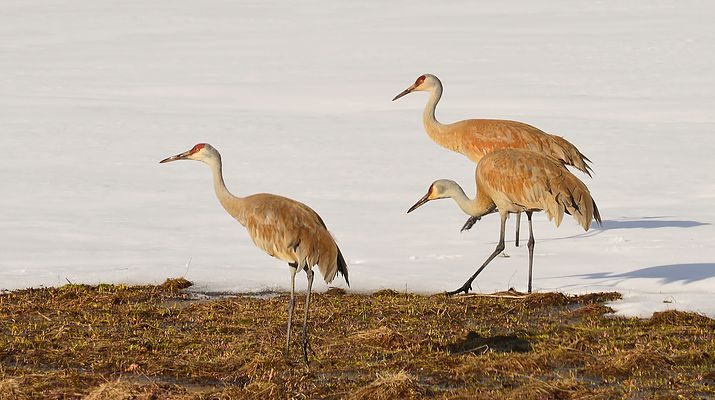The sciences offer a profound way of viewing and learning about the world we live in. This program features contributions to our scientific understanding from local thinkers, researchers, and scientists.
-
Eric Bendick: Path of the Panther
On April 20, 2023 The Bozeman Doc Series and Gallatin Valley Earth Day present the award winning, new documentary from Bozeman based Grizzly Creek Films and director, Eric Bendick, PATH OF THE PANTHER.
Drawn in by the haunting specter of the Florida panther, it follows a wildlife photographer, veterinarians, ranchers, conservationists, and indigenous people, who find themselves on the front lines of an accelerating battle between the forces of renewal and the forces of destruction that have pushed the Everglades to the brink of ecological collapse.
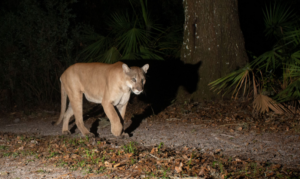
Once ubiquitous in North and South America, but now perched on the edge of extinction, this perilously small, sole remaining population of the panther east of the Mississippi is an emblem of our once connected world. A vision of what could be again.
We spoke with the Emmy Award winning director of Path of the Panther, Eric Bendick, about his work and this powerful new film, Path of the Panther.You can find out more by going to https://www.gallatinvalleyearthday.org/ or http://www.bozemandocseries.org
or Download -
Rangelands Management
Dr. Lance McNew, MSU Associate Professor of Wildlife Habitat Ecology, discusses how working rangelands can be managed to preserve grouse, songbirds, and other range-dependent wildlife.
or Download -
Dana Longcope Solar Flares: Dramatic, Disruptive and Puzzling
The sun is a vital source of light and warmth, but it also produces violent flares and eruptions that can disrupt navigation, communication and electricity here on Earth. These disruptive events occur when magnetic field energy, stored through the sun’s million-degree corona, is readily converted into other forms by a process that is still poorly understood. The physics behind this energy conversion remains the focus of active research, both through theoretical modeling and observation using orbiting X-ray telescopes.
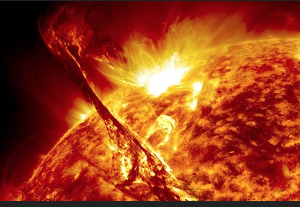
In this first Provost Distinguished Lecture of the Fall 2022 semester, Dana Longcope, Professor and Head of the Department of Physics at Montana State University, Bozeman, discusses his work and the current state of knowledge in this lecture, titled: Solar Flares, Dramatic, Disruptive and Puzzling. It was recorded at the Museum of the Rockies on October 18, 2022. He was introduced by Dr. RIchard Canfield, Research Professor, retired in the MSU Department of Physics.
or Download -
David Quammen: Racing COVID
Science writer David Quammen presented a talk at the Museum of the Rockies entitled Racing COVID: How Science Battled a New Global Pandemic, in which he discussed the origins of COVID-19, the most unexpected things he learned about it, and the compelling stories of scientists who raced to understand it and develop vaccines, as described in his new book Breathless: The Scientific Race to Defeat a Deadly Virus. The book has recently been announced as a finalist for the National Book Award in nonfiction. Recorded October 19, 2022.
or Download -
Land Grant Universities & Climate Change: Paul Lachapelle & Patrick Belmont
Dr. Paul Lachapelle is a Professor In the Department of Political Science at MSU Bozeman. His research includes community climate change resiliency, diversity and inclusion, and social justice issues. He is the faculty advisor to The Campus Climate Coalition, a student group, as well as Climate Smart Montana, an outreach organization.
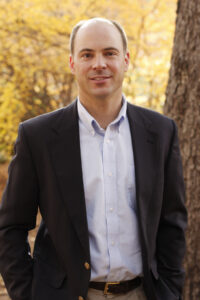 Dr. Paul Lachapelle
Dr. Paul LachapelleDr. Patrick Belmont is a Professor and Head of the Department of Watershed Sciences at Utah State University. He conducts research in the fields of hydrology, geomorphology and climate science. He is currently studying wildfire impacts on fish populations and water reservoirs. He recently completed studies on the impacts of climate change on ski resorts and the management of public lands in the US West.
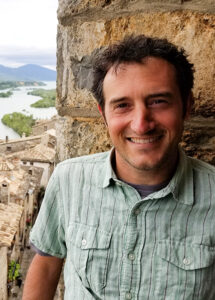 Dr. Patrick Belmont
Dr. Patrick BelmontKGVM Board of Directors member, Yvonne Rudman, interviewed them on November 3, 2021 about the significant role Land Grant Universities can play in mitigating the negative impacts of climate change in The Age of the Anthropocence.
TED Talk: Redefining Climate Change Denial, Dr. Patrick Belmont, March 2021Climate Smart Montana, a non-partisan, non-profit network with the goal of sharing information and resources to better coordinate community-based climate solutions and resiliency efforts in Montana.Campus Climate Coalition, a student-led, faculty-supported, and action-oriented group united through values of intersectional justice and aspirations for institutional change.
or Download -
Café Scientifique: Wildfire in Montana
“Understanding how climate, ignitions and fuel conditions have changed over centuries and millennia can help us better understand why fire seasons in Montana have been getting worse and lend important context to events such as the Bridger Foothills Fire we saw in Bozeman last year.”
That quote is from Professor Dave McWethy of Montana State University’s Department of Earth Sciences. He presented at a Cafe Scientifique program sponsored by Montana INBRE, entitled “The Past and Future of Wildfire in Montana: How Changes in Climate, Fuels and Human Activity are Driving Longer, More Destructive Fire Seasons.”
or Download -
Union of Concerned Scientists: Connecting Faith, Climate and Justice
Climate change does not exist as its own calamity—it is deeply interconnected with the inequities and injustices that pervade our society, both in the United States and globally. How do faith leaders connect the call of faith with the need for action on climate change and racial justice?
On December 8, 2020, the Union of Concerned Scientists held an on-line panel titled: Connecting Faith, Climate and Justice. Ken Kimmell, the president of The Union of Concerned Scientists, began with an introduction on the topic. The Rev. Canon, Sally Bingham, founder of the national environmental organization, Interfaith Power and Light, was the moderator. She introduced the panelists, Ibrahim Abdul-Matin, Rabbi Melanie Aron, Rev. Dr. Gerald Durley, and Dr. William Edelglass.
or Download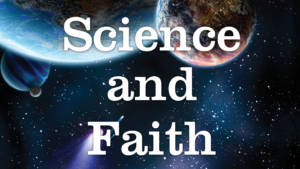
-
Bill McKibben – Turning the Corner on Climate Change
On October 5, 2020 The Northern Plains Resource Council hosted a conversation with ecologist, author, activist, Bill McKibben via Zoom. He spoke about the state of play in which we find ourselves when it comes to climate change and the future we can create together, including local solutions already in motion here in Montana.
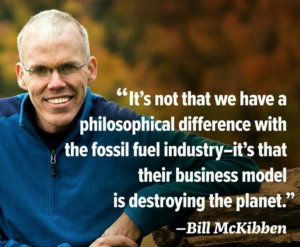
You can find out more about the Northern Plains Resource Council and their work by going to northern plains.org.
or Download -
Slowing the Spread: How We Can Detect the Virus in Multiple Ways
On the evening of Sept. 23, 2020, the second in a series of webinars was hosted by MSU Bozeman’s Initiative for Science, Technology, Ethics & Society, entitled SLOWING THE SPREAD: HOW WE CAN DETECT THE VIRUS IN MULTIPLE WAYS, featuring Dr. Blake Wiedenheft and Dr. Seth Walk (Associate Professors in Microbiology & Immunology at Montana State University), who discussed their efforts to test for SARS-CoV-2 in wastewater and expand testing in Montana.
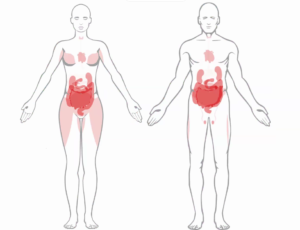
Parts of human body most affected by SARS-CoV2 – the intestines are highly involved.
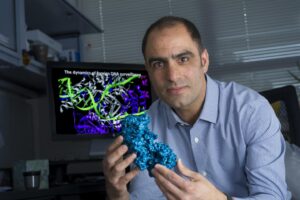 Dr. Blake Wiedenheft
Dr. Blake Wiedenheft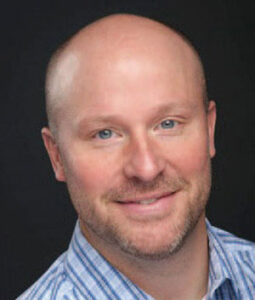 Dr. Seth Walk
Dr. Seth WalkDr. Kristen Intemann, Director of the Initiative for Science, Technology, Ethics & Society, moderated the discussion.
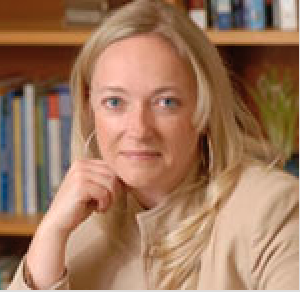
You can find out more here: http://www.montana.edu/stes/
or Download -
SPILLOVER: UNDERSTANDING THE ORIGINS OF PANDEMICS with David Quammen & Raina Plowright
On the evening of August 26, 2020 the first part of a series of online community fora on topics related to the COVID-19 pandemic was held. Sponsored by the Initiative for Science, Technology, Ethics and Society at Montana State University, Bozeman, it was titled, SPILLOVER: UNDERSTANDING THE ORIGINS OF PANDEMICS.
It featured presentations by award winning author, David Quammen, whose 2012 book, SPILLOVER: ANIMAL INFECTIONS AND THE NEXT HUMAN PANDEMIC, warned of coming pandemics; and Dr. Raina Plowright, Associate Professor of Microbiology & Immunology, who specializes in the dynamics of infectious diseases and the process of pathogen spillover from animals to humans.
Professor Kristen Intemann of the MSU History & Philosophy Department and Director of the Initiative for Science, Technology, Ethics and Society, moderated the discussion.
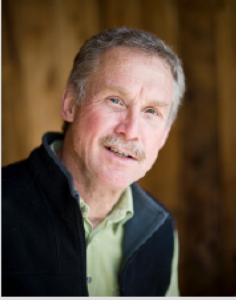

David Quammen Dr. Raina Plowright

Dr. Kristen Intemann
You can find out more here: http://www.montana.edu/stes/
or Download -
Adventure Scientists’ Wilderness Connectivity Project
Bob interviews Jen Shoemaker of Adventure Scientists about the organization and specifically about their Wilderness Connectivity project, and their multi-phase road cycle rides to gather data for the project.
or Download -
Temple Grandin: Understanding Animal Behavior and Autism
On the evening of February 20, 2020, Bozeman’s Ellen Theater was filled to overflowing with an enthusiastic crowd to hear Temple Grandin’s lecture, “Understanding Animal Behavior and Autism.”
The free, public event was sponsored by the Bair Ranch Foundation and the MSU Bozeman Department of Animal and Range Sciences, as part of the Bair Ranch Foundation Seminar Series.
Thanks to Josh McCintyre and the Ellen Theater for production assistance with this recording.
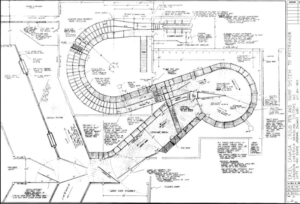 .
.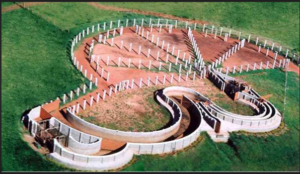
or Download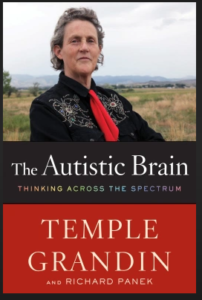
-
Trails to Yellowstone and Other Biotech Adventures – Dr. Brent Peyton
Brent Peyton came to MSU in 1986 to being his doctoral studies as a chemical engineer. He quickly became enthralled with field microbiology in Yellowstone. Professor Peyton is now the director of MSU’s Thermobiology Institute and works at the cutting edge of biological engineering, harnessing the ability of microbes to make biofuel, to clean up mining pollution, and perhaps to recycle plastic. In this Provost’s Lecture, he describes the development of his career and the areas he has worked in.
Recorded at the Museum of the Rockies on November 5, 2019.
or Download -
Butterflies as Ecological Indicators
Parnassius butterflies lay their eggs each year in montane meadows during mid-summer. The eggs overwinter under the deep snow, hatching into caterpillars in the spring when the snowpack melts. As temperatures increase and the duration of snow cover in our region shortens, these butterflies can serve as an ecological indicator for montane ecosystems because they are abundant, showy, and easily identified.
Dr. Diane Debinski is the Department Head and Professor of the Ecology Department at Montana State University. Dr. Debinski and her students have been studying Parnassius butterflies and the flowering plants that they use for nectar in the Greater Yellowstone Ecosystem for over 25 years. Hear the story of how this small white butterfly may provide a window into understanding how climate change may be affecting montane ecosystems worldwide.
Recorded at the Museum of the Rockies on October 23, 2019.
or Download -
Sociobiology
Michael Reidy is Professor of History in the Department of History and Philosophy at Montana State University. His special niche in research is how the sport of mountaineering advanced the practice of science in the nineteenth century. But in this talk for the Institute on Ecosystems Rough Cut Science series, he discusses a more general and contentious topic in the history of science, namely the rise of sociobiology. Along with biographical details about the best-known proponent, E. O. Wilson, Reidy also mentions an earlier contributor, the 19th century Russian scientist and anarchist Peter Kropotkin. The evolution of sociobiology continues today, with modern genetics affecting thought across many disciplines.
Recorded at Montana State University on September 25, 2019.
or Download -
Using Technology to Fight the Flu—One Cell at a Time
To best understand a community, one needs to understand the individuals that compose it. In the case of bacterial communities, such as biofilms, the bacteria are so tiny and so numerous that single cell studies in the laboratory are slow and tedious. Dr. Connie Chang, professor in MSU’s Chemical and Biological Engineering Department, is a leader in the use of “droplet-based microfluidics” to perform such studies far faster than previously possible. In this talk to the Gallatin Valley Friends of the Sciences, she introduces microfluidics methods and their advantages, and describes her work on the behavior and evolution of norovirus and influenza virus. She also mentions upcoming work on Yellowstone biofilms.
Recorded on May 15, 2019 at the Museum of the Rockies.
or Download -
Chickensplash! Exploring the Health Concerns of Washing Raw Chicken
or DownloadAt MSU’s annual spring poster research presentations, there was one with a the particularly intriguing title given above. The presenter was Caitlin Carmody, a junior from Butte. Her research with Professor Jim Wilking stems from the Food and Drug Administration recommendation against washing raw chicken, due to the risk of transferring dangerous pathogens through splashing. Yet many people continue to wash raw chicken, and there is actually a lack of scientific evidence to demonstrate the danger of microbe transfer through splashing. Cati describes her research on the topic in this interview. A full abstract can be found in the official program (PDF).
-
MSU Climate Conference
The Climate Conference at Montana State University, coordinated by engineering students Hannah Smith and Callista Schoettmer, and hosted by the Norm Asbjornson College of Engineering and the Montana State University Chapter of the American Institute of Chemical Engineers, was an open event designed to unite the Montana community in the fight against our changing climate. The participating speakers were, in order:
Dean Brett Gunnink – Energy Efficiencies in Norm Asbjornson Hall
Dr. Nick Silverman – The Role of Carbon Dioxide in Climate Change and Modeling Climate Change in the Near Future
Dr. Bruce Maxwell – How Ecological Systems are Evolving with Climate Change
Dr. Paul Lachapelle – Community Efforts to Address Climate Change
Dr. Fabian Menalled – How Climate Change is Affecting Crop Yields, Weeds, and Pathogens
Jim Williams – View from the Center of the Universe: Climate Change and Energy MarketsFor further information about the speakers and the event, see the MSU AICHE Climate Conference website. Recorded April 27, 2019 at Montana State University.
To download, right-click or control-click on the track name, and select Save Link As.
-
Nerves, Metabolism and Bugs
At a Café Scientifique presentation, Montana State University researchers from three disciplines, Frances Lefcort, Valérie Copié and Seth Walk, teamed up to present “Nerves, metabolism and bugs: How your brain, liver and gut interact to influence health.” They addressed a rapidly emerging area of science related to the microbiome, which includes the diverse ecology of microorganisms that live in the human gut. The microbiome is now being found to relate to phenomena in the brain, and plays a role in neurodegenerative diseases like Parkinson’s and Alzheimer’s, as well as other areas of health.
This recording has been edited to give the flavor and the main thrust of this informal and interactive event, leaving out some of the questions and responses from the audience, along with corresponding contributions from the expert panel.
Recorded at the Baxter ballroom in Bozeman on January 30, 2019.
or Download -
Digital Agriculture
Patrick Ewing is an agroecologist, recently moved to Bozeman, who works at the intersection of soil ecology, cropping systems, and data science. In this Special Seminar at MSU’s Institute on Ecosystems, Ewing discusses how different technologies may enable complex, ecologically-informed agriculture, allowing us to achieve goals such as reduced pollution and carbon impact, while simultaneously maintaining or increasing crop yields.
Recorded at Montana State University on February 7, 2019.
or Download
